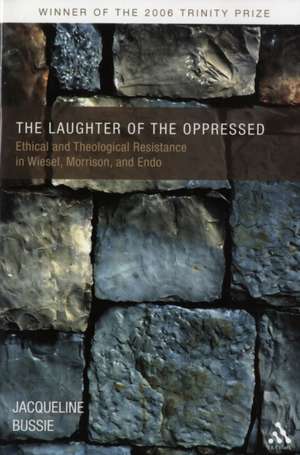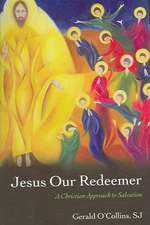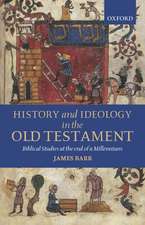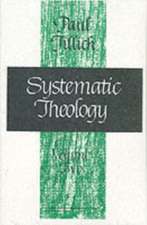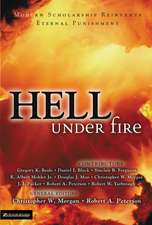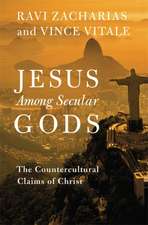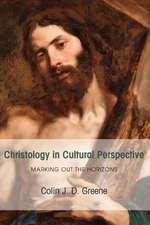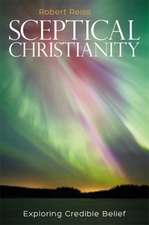The Laughter of the Oppressed: Ethical and Theological Resistance in Wiesel, Morrison, and Endo
Autor Dr. Jacqueline A. Bussieen Limba Engleză Paperback – 14 dec 2007
| Toate formatele și edițiile | Preț | Express |
|---|---|---|
| Paperback (1) | 237.02 lei 6-8 săpt. | |
| Bloomsbury Publishing – 14 dec 2007 | 237.02 lei 6-8 săpt. | |
| Hardback (1) | 772.42 lei 6-8 săpt. | |
| Bloomsbury Publishing – 14 dec 2007 | 772.42 lei 6-8 săpt. |
Preț: 237.02 lei
Preț vechi: 305.37 lei
-22% Nou
Puncte Express: 356
Preț estimativ în valută:
45.36€ • 49.25$ • 38.10£
45.36€ • 49.25$ • 38.10£
Carte tipărită la comandă
Livrare economică 23 aprilie-07 mai
Preluare comenzi: 021 569.72.76
Specificații
ISBN-13: 9780567026781
ISBN-10: 0567026787
Pagini: 224
Dimensiuni: 153 x 226 x 16 mm
Greutate: 0.33 kg
Editura: Bloomsbury Publishing
Colecția T&T Clark
Locul publicării:New York, United States
ISBN-10: 0567026787
Pagini: 224
Dimensiuni: 153 x 226 x 16 mm
Greutate: 0.33 kg
Editura: Bloomsbury Publishing
Colecția T&T Clark
Locul publicării:New York, United States
Caracteristici
1. It's the 2006 Trinity Prize winner. 2. A multicultural, interdisciplinary study of the ethical and theological significance of the laughter of persecuted and oppressed groupsâ?"namely, African Americans, Jews, and Japanese Christians. 3. It's the 2006 Trinity Prize winner. 4. Offers a fresh reading of the relationship between literature and theology.
Cuprins
Chapter 1: Laughter 'from below'A. Contemporary case studyB. Project Origins, Questions, and ObjectivesC. Methodological Questions and AnswersChapter 2: Authoritative Voices Speak: Philosophers and Theologians Weigh-In on LaughterA. Laughter and Philosophical InquiryB. Laughter: A Theological TableauC. Laughter and Modern Fiction: The 'Hidden Transcript'Chapter 3: 'God's Mistake:' Laughter in Elie Wiesel's Gates of the ForestA. Linguistic Rupture and Laughter as Ethical ResistanceB. Resources for Resistance within HasidismC. Laughter and the Paradox of FaithD. Scriptural and Midrashic LaughterChapter 4: Believing Apostates: Laughter in Shusaku Endo's SilenceA. Narratives in ConflictB. Laughter as Kenosis C. Laughter's Relationship to a Theology of the CrossChapter 5: Flowers in the Dark: African American Consciousness, Laughter, and Resistance in Toni Morrison's BelovedA. Baby Suggs: The 'Unchurched Preacher'B. Sixo: Laughing to DeathC. Paul D: The Last of the Sweet Home MenChapter 6: Toward a Theology of LaughterA. Faith and Hope as Paradoxical and ProplepticB. The Inadequacy of Either/OrC. Theological Honesty and the Problem of FinitudeD. The Problematic of a Theology of SufferingE. The Limits of Theodicy
Recenzii
"Political jokes arise in dictatorships and their laughter is liberating oppressed and silenced people. They are nothing less than a resonance of the laughing God in heaven. "The Lord shall have them in derision." (Ps 2,4). The arrogance of power is ridiculous because God is God. I read this fascinating study with growing admiration. It is a masterpiece and a great contribution to every liberating theology." -Jurgen Moltmann
"Jacqueline Bussie reads familiar texts with a keen theological eye and provides fresh and innovative insights into these literary classics. With exquisite literary sensibility and bold theological imagination she helps her readers to understand how genuine laughter emerges from the depths of suffering. This is theological writing of the highest order - intelligent, faithful, and deeply moving." -Ronald F. Thiemann, Bussey Professor of Theology, Harvard Divinity School
"This text is an important theological interpretation of the meaning of laughter for the oppressed. I strongly recommend it." --James H. Cone, Charles Augustus Briggs Distinguished Professor of Systematic Theology Union Theological Seminary New York, N.Y.
"Bussie listens deeply to the voices of people traditionally marginalized to discover how they have given expression to the paradox of 'colliding narratives' and responded creatively to tragic suffering...The Laughter of the Oppressed...is indispensable for those concerned with theodicy and the problem of suffering, the theology of the cross, liberation theologies, and the use of fiction as a theological resource." -Karen Teel, Catholic Books Review
[An] elegantly-written book... Maybe the last paragraph of the Time Magazine article referred to in the beginning of this review provides a fitting postscript to Bussie's wonderful book: " 'In the end,' says Tutu, 'the perpetrators of injustice or oppression . . . will bite the dust.' The thought still delightshim. 'Ha-ha-ha-ha-ha!' he roars. 'Wonderful! Wonderful! Wonderful!"
"Jacqueline Bussie reads familiar texts with a keen theological eye and provides fresh and innovative insights into these literary classics. With exquisite literary sensibility and bold theological imagination she helps her readers to understand how genuine laughter emerges from the depths of suffering. This is theological writing of the highest order - intelligent, faithful, and deeply moving." -Ronald F. Thiemann, Bussey Professor of Theology, Harvard Divinity School
"This text is an important theological interpretation of the meaning of laughter for the oppressed. I strongly recommend it." --James H. Cone, Charles Augustus Briggs Distinguished Professor of Systematic Theology Union Theological Seminary New York, N.Y.
"Bussie listens deeply to the voices of people traditionally marginalized to discover how they have given expression to the paradox of 'colliding narratives' and responded creatively to tragic suffering...The Laughter of the Oppressed...is indispensable for those concerned with theodicy and the problem of suffering, the theology of the cross, liberation theologies, and the use of fiction as a theological resource." -Karen Teel, Catholic Books Review
[An] elegantly-written book... Maybe the last paragraph of the Time Magazine article referred to in the beginning of this review provides a fitting postscript to Bussie's wonderful book: " 'In the end,' says Tutu, 'the perpetrators of injustice or oppression . . . will bite the dust.' The thought still delightshim. 'Ha-ha-ha-ha-ha!' he roars. 'Wonderful! Wonderful! Wonderful!"
